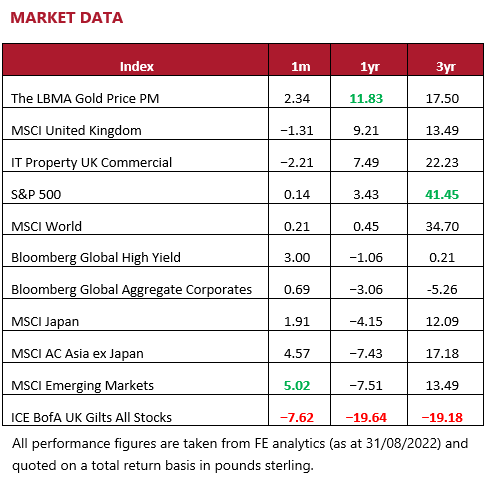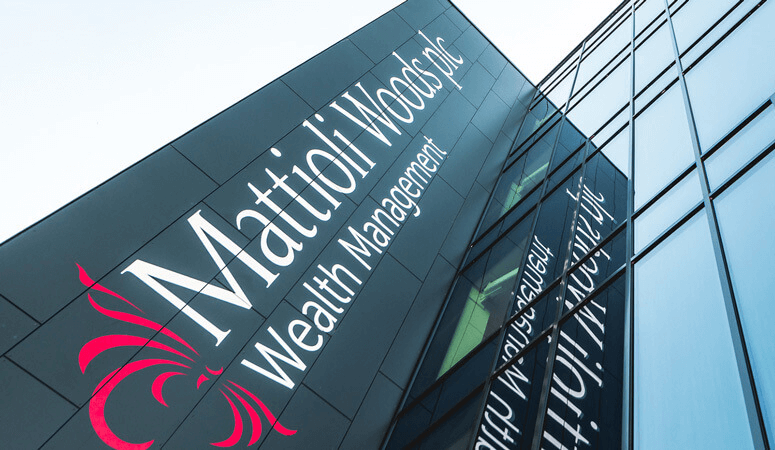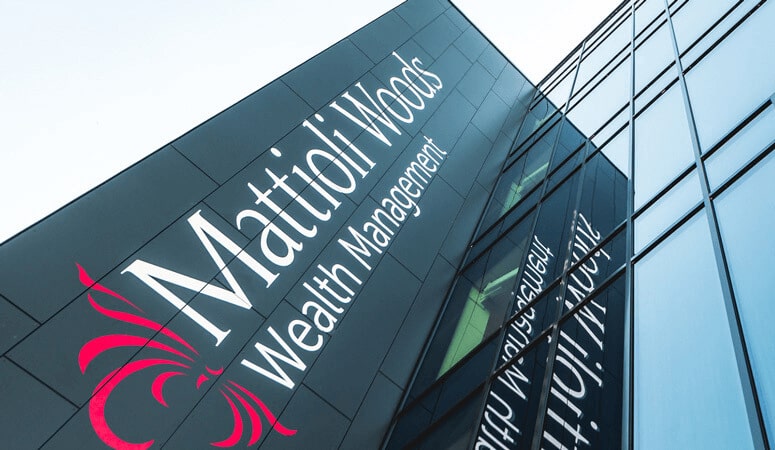United Kingdom - September 2022
While most unsolved mysteries (is it even a mystery if it is solved?) are based around crimes, there are others, usually natural phenomena … but then there is the UK economy! Will there be a recession as predicted by the Bank of England (or worse), how long will it last, will the new Prime Minister have the tools (perhaps found buried under the magic money tree in the garden at 10 Downing Street) to help the vast majority who will struggle to meet their basic energy bills this winter (and well into 2023)? At the time of writing the suggestion is that Prime Minister Truss will announce a freeze on all household energy bills until 2024. Different commentators price that between £70bn and £116bn … and most assume this plan will need to include businesses too. One word of caution for the government – could this be an unintentionally open ended pledge if prices are stubbornly high still in 2024?
Assuming it comes through (after publication), this could have a massive impact but won’t in itself rescue the UK economy from recessionary forces. Most of the people who will benefit most from such a freeze have no money to spare right now anyway, and many others are tightening their belts as inflation hits across the board. Indeed, many suggest the very people who need this help least will benefit most.
A cost of living crisis is not a mystery. A reduction in spending follows when income (earned and/or unearned) fails to keep up with inflation by any significant amount and/or for any significant time. This is especially so when, as in the UK, many millions of people have less than £500 saved/accessible. We may not be the neurotic consumers of old, but this is an economy driven by the consumer.
Having said all of the above, there are clearly very interesting pockets of opportunity for investors, not least in the UK. Our portfolios are pretty fully invested, despite higher than long-term cash levels in most. It is just that we see fewer things we like, so expect us to be increasingly more targeted (still diversified) as we enter the final quarter of a tough year.
North America - September 2022
Having been at 9.1% in June, the July US Consumer Price Index inflation figure of 8.5% was a pleasant surprise for markets. Falling clothing, education and fuel prices were key components and lower gasoline prices will also most likely see the August headline figure fall too. It could well be that we have seen the peak of headline inflation in the US, but that is not to say the rate will fall quickly from here.
Stripping out energy and food costs, other elements are still seeing price rises. In particular housing market costs, which rose less than expected in the July number, and labour costs are likely to ensure that headline inflation remains far above the 2% target level of the Federal Reserve. Wages are the biggest cost input for business, particularly in the services sector, and while the US job market remains tight productivity has fallen. Whereas the peak in the headline element of inflation might have been seen, these elements are still growing.
The next meeting of the Federal Reserve is 21 September and there will be updated jobs and inflation numbers before then that may impact thinking. Currently, it is anticipated that we will see another 0.75% increase in interest rates, with inflation remaining so far ahead of the target.
Away from the economic data, the most significant political news went a little under the radar given events around former President Donald Trump. Current President Joe Biden and the Democrats passed the Inflation Reduction Act. This new $750 billion act introduces new minimum tax levels on large corporates and buybacks, which will fund around $430 billion on carbon reduction and healthcare, with the rest reducing the deficit. While the buyback tax may change some corporate behaviour, the largest ever environmental spending commitment will be a positive for green industries.
New Year’s Eve 2010 in the small town of Beebe, Arkansas, 5,000 blackbirds died on the same night. Many of them were behaving erratically and flying into stationary objects. Having blamed the death on fireworks, locals were shocked to find the same issue next year, despite a ban on pyrotechnics … a mystery indeed!
We maintain caution on some of the more growth areas of the US markets given the tough economic outlook, owning a blend of growth and value, both directly in geographical funds and through our preferred themes.
Europe - September 2022
While US inflation fell, this side of the Atlantic that has not been the case, with August’s eurozone inflation figures reaching 9.1%, according to the August Eurostat flash estimate. Looking under the bonnet, Europe has a large element of inflationary pressure coming from energy prices and food prices, both having been impacted by the war in Ukraine. Unemployment in the eurozone has reached a record low of 6.6%, with labour also proving resilient as it has in the US.
This is putting pressure on the European Central Bank (ECB) (and indeed the Bank or England) to raise interest rates to try to rein in inflation, although these external inputs will limit the effectiveness compared to the energy independent US. At the annual economic Jackson Hole meeting ECB executive board member Isabel Schnabel stated that the ECB is willing to ‘sacrifice’ jobs and growth to get inflation back under control.
Higher energy prices are also impacting manufacturing, with German Economy Minister Robert Habeck suggesting that some industries have had to stop production due to gas shortages or the higher price of energy. At the same time weakness in the Chinese economy also means a major source of demand for European goods has slowed. With winter coming, more pressure is expected, with rationing of energy a prospect muted by some commentators.
St. Vitus’ dance (or dancing mania) was a phenomenon recorded between the 14th and 17th centuries in Europe, where groups of people would begin dancing together until they collapsed from exhaustion or injuries. Notable outbreaks occurred in Aachen, Germany, in 1374 and Strasbourg, France, in 1518. The precise cause of these outbreaks remains a mystery with theories ranging from mass psychogenic illness to religious cult activity.
While high inflation is a similar issue both sides of the Atlantic, Europe has a more difficult challenge given the larger commodity input component. A difficult winter is in prospect with rising rates against the backdrop of a recession. We invest in companies not economies but must consider the challenging environment they operate in. We are generally neutral or underweight European equities.
Rest of the World - September 2022
We now know that 16 October will be the date the Chinese Communist Party Congress will begin. This gathering will see President Xi Jinping gain a third term as President following a previous rule change as well as being able to appoint allies to top bodies and consolidate his grasp on power. China is still facing some economic challenges, most notably those self-inflicted from the continuing zero-Covid policy and issues in the housing market.
French bank Natixis estimates the continuing policy will cost 1.6–2.0% of GDP, which is a significant headwind to overcome if China is to meet its 5.5% annual growth target. The Congress is a chance to announce any big changes in policy, and a move away from zero-Covid is one that could dramatically improve China’s prospects; however, given it is a signature policy of President Xi, it might not be as simple as that.
The property market slowdown also continues to weigh on the economy and manufacturers, along with severe droughts and heatwaves hitting important industrial regions. The use of water in manufacturing processes as well as reliance on hydropower has seen disruption to economic activity. These conditions have also led to worsening industrial sentiment, with the Caixin manufacturing purchasing managers’ index falling to 49.5 for August. As a reminder, a print below 50 signals contraction.
Between 1975 and 1989, seven women were murdered within a 20 km radius of each other in Saga Prefecture Japan, all of whom were thought to have been strangled and all but one disappeared on a Wednesday. The culprit came to be known as The Wednesday Strangler, but they have never been caught.
While we do not doubt China’s long-term potential, these short-term headwinds mean we prefer to have minimal direct exposure to the country at present, preferring selective exposure as part of a broader Asia or Emerging Market strategy where held.
Commodities - September 2022
‘Rare earth’ is a generic term used to describe 17 metals and they tend to have a range of applications in electronics and industrial processes (e.g. lasers, which are vital as part of the semi-conductor manufacturing process). Most rare earth metals are not household names, in fact some are incredibly difficult to pronounce (see praseodymium and ytterbium)! Neodymium is one of the more commonly used and has highly attractive magnetic properties and plays a crucial role inside wind turbines.
The term ‘rare earth’ is something of a misnomer, as the elements themselves are relatively abundant. The issue is that they are relatively well dispersed, which can make them more difficult and expensive to extract. Historically, the US dominated supply, but producers were pushed out by Chinese competitors flooding the market at low cost. Today, China accounts for 90% of the world’s rare earth mineral production and is in control of the refining and processing sectors.
In 2020, the US appeared to grasp the size of the potential issue, with various bills to offer tax breaks in relation to US rare earth mineral production and use being floated by senators. The Pentagon also agreed to fund the first rare earth processing facility in the US and is backing similar projects. Similar policies are being looked at by the European Union, who see China’s dominance as a threat to businesses, as well as their ambitions to meet their climate ambitions.
When it comes to unsolved mysteries, few spark the imagination more than buried treasure. While thought to be commonplace, the only pirate known to have buried treasure was William Kidd, who many believe hid some of his wealth near Long Island prior to sailing to New York City. His ploy to bargain for his freedom with the treasure failed and he was hanged for piracy.
The potential for the weaponisation of rare earths is something we consider in our longer-term macro outlook. In 2010, China cut off rare earth export to Japan and has already hinted that it might look to limit exports to focus on its own transition. Europe believes that it can wean itself off Russian gas by going green, but the issue is that China has the ability to dictate whether that happens or not. The investable universe remains incredibly narrow and we continue to watch from the sidelines for now.
Technology - September 2022
Sometimes, you wonder how long it takes for governments and corporates to reverse engineer acronyms. In late July, US Congress signed the Creating Helpful Incentives to Produce Semiconductors for America Act into law. More commonly known as the CHIPS act, the statute provides $280bn to the industry, through a mix of research grants and tax credits to chip makers with operations in the US. The act garnered bi-partisan support, with the US government keen to dilute the influence that China wields over the semi-conductor market.
Unsurprisingly, Chinese officials were critical of the bill, claiming that it harmed global trade and was reminiscent of a ‘Cold War mentality’. From the US perspective, it is Chinese aggression towards Taiwan (one of the world’s largest semiconductor manufacturers) that made the bill necessary. This, along with the supply chain vulnerabilities that became obvious following the Covid-19 pandemic.
In the US, things have already started to move, with Intel striking a partnership with Brookfield Infrastructure Partners to fund a $30bn semiconductor factory in Arizona. While opponents claimed the act bribed companies to operate out of the US, President Biden stated that he believed the act would help to lower ‘prices on everything from cars to dishwashers’, and create more resilient supply chains and more US jobs. World leaders appear aligned with their thinking, with Germany and Japan announcing plans on a smaller scale in recent months.
The semiconductor industry is in an interesting position, with supply chain issues abating as demand looks set to fall. We have exposure to manufacturers through our technology allocation, as well as through allocations to regional equities. The long-term structural drivers remain intact and a more regional approach to production could benefit some.
Responsible Assets - September 2022
‘ESG’ and ‘woke’ are two of the most overused and abused terms of the moment. Some 60 years after novelist William Melvin Kelley wrote the earliest known use of the word under its new definition in his article, ‘If you’re woke, you dig it’, it has been co-opted by those with an agenda as a derogatory and mocking term. ‘ESG’ is younger, first coined in the 2000s, but has become similarly ubiquitous across the investment landscape over the past few years and the two are now bound together. The backlash against the concept of ESG, or at least the concept as the media has painted it (which we shall see is not quite accurate), was inevitable and whereas companies were once afraid of being accused of lacking in probity, they now fear being condemned as ‘woke’. The ridicule, however, comes from a fundamental misunderstanding of ESG analysis.
Last month, announcements emerged from US states Texas and Florida that effectively prohibit the consideration of ESG risk management for pension fund investment. State pension and school funds will be required to divest shares they hold in listed financial groups that, in the government’s view, supposedly boycott fossil fuels.
This development highlights a troubling view and misconception that appears to have misunderstood both ESG analysis and Socially Responsible Investing. Firstly, the terms are not interchangeable; responsible investing tends to be based on values and often exclusionary or seeking positive change whereas ESG is based on risk and is far more nuanced. When we say we dislike a company in terms of ESG, what we mean is that we foresee risks related to ESG issues that may either impair or enhance a security’s value. Responsible investing does integrate ESG analysis and may have higher standards than a fund without any sort of ‘responsible’ mandate, but an ‘ESG fund’ is a misnomer. In our view, all funds should be analysing risks posed by poor governance, environmental management and social policies as these all do fundamentally impact share prices.
In the spring of 1946 Texarkana, Texas, became known as ‘the town that dreaded sundown’. Over a three-month period, an unidentified serial killer attacked couples, claiming five lives in the process. The incidents only occurred late at night and were usually three weeks apart. The perpetrator of these moonlight murders then disappeared without leaving any clues as to their identify and remains known to this day as ‘the Phantom Killer’.
We view ESG as a risk management tool and integrate this into all of our portfolios in the same way we do liquidity and concentration risk. While we do have some traditional energy company exposure within portfolios, we also have exposure to companies benefitting from and facilitating the transition to clean energy, as we believe it is the most seismic shift of our lifetime and will result in energy independence.
Infrastructure - September 2022
August was another tough month for markets, but one of the areas in which we invest that continued to hold up well was infrastructure assets, specifically the UK listed investment trusts. Our core portfolios have exposure to a range of operational infrastructure assets across a diverse spread of sectors including education, health, government office, police accommodation, courthouse, custodial and transportation. Although listed in the UK, these trusts have exposure to assets in a number of developed markets, particularly Europe and the US. There is also significant exposure to UK-based renewable energy assets that have been helpful given the uplift provided by soaring power prices.
This April, France experienced one of the most significant infrastructure attacks in its history. Thousands of Parisians were plunged into connectivity blackout after crucial long-distance internet cables were deliberately cut in three locations around the French capital city including near Disneyland Paris. The perpetrators along with the reason for their vandalism remain unknown.
We continue to hold a broad spread of infrastructure assets viewing their more defensive characteristics favourably in the current economic environment. These assets deliver predictable, attractive and sustainable investment yield in addition to the potential for capital appreciation.


The Monthly Market Commentary (MMC) is written and researched by Simon Gibson, Richard Smith, Scott Bradshaw, Jonathon Marchant and Lauren Wilson for clients and professional connections of Mattioli Woods, and is for information purposes only. It is not intended to be an invitation to buy, or to act upon the comments made, and all investment decisions should be taken with advice, given appropriate knowledge of the investor’s circumstances. The value of investments and the income from them can fall as well as rise and investors may not get back the full amount invested. Past performance is not a guide to the future. Mattioli Woods is authorised and regulated by the Financial Conduct Authority.
The MMC will always be sent to you by the seventh working day of each month, usually sooner, is normally delivered via email, and is free of charge as the MMC is generally made available to clients who have assets under our management in excess of £200,000, and to all clients under our Discretionary Portfolio Management Service (DPM). Normally, the MMC costs £397 + VAT per annum. Professional advisers and their clients should contact us if they are interested in receiving a monthly copy.
Sources:
www.bbc.co.uk,
www.bloomberg.com,
Financial Express,
www.thedragonsblade.com,
www.express.co.uk,
www.pitstoppin.co.uk,
www.sibcyclinenews.com,
www.vr-12.com,
www.smalltalkbigresults.wordpress.com,
www.anonw.wordpress.com
www.avantida.com,
www.plazmedia.com,
www.viewzone.com,
www.mmn.com.
All other sources quoted if used directly; except fund managers who will be left anonymous; otherwise, this is the work of Mattioli Woods.





